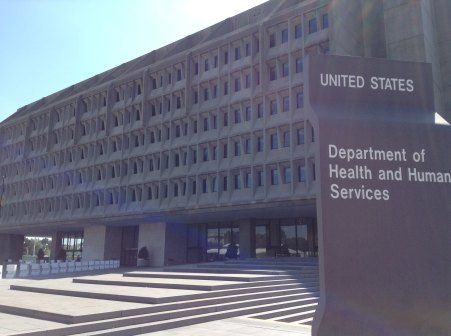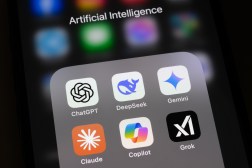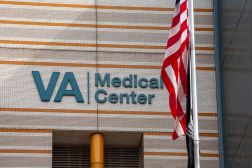White House launches precision medicine projects

The White House Thursday kicked off a spate of key initiatives that lay the groundwork for using data on patients’ genes, environment and lifestyle to better treat diseases like cancer.
President Barack Obama, who launched his so-called Precision Medicine Initiative last year to encourage research in the field, said advances in computers and the use of big data have heralded a new era for medicine.
“We may be able to accelerate the process of discovering cures in ways that we’ve never seen before,” he said, speaking to a standing-room-only crowd that gathered for a PMI summit at the Eisenhower Executive Office Building.
Most of the announcements Thursday centered on the development of a million-person research cohort from which researchers could draw more detailed data about diabetes, Alzheimer’s and a host of other conditions. Such data, researchers hope, could help uncover new cures or ways to prevent illnesses. To start up the cohort, National Institutes of Health said Vanderbilt University and Verily, formerly known as Google Life Sciences, would launch a pilot to study the best ways to enroll, engage and maintain participants.
NIH Director Francis Collins said the cohort will take three to four years to assemble, and participants will be followed for “many years.”
“We want to enable and empower any person anywhere in the United States to be able to raise their hand and volunteer to participate,” he said. “And that means people from all walks of life — rich and poor, young and old, urban and rural, and all races and ethnicities.”
With that in mind, NIH also will work with the Health Resources and Services Administration — an agency of Health and Human Services — to find community health centers which will encourage members of underserved and underrepresented groups to participate in the cohort.
NIH also initiated “Sync for Science” with the Office of the National Coordinator for Health IT to develop open standards for electronic health records that would allow people to donate their data for research.
A key aspect of the Precision Medicine Initiative, Obama said during the event, is breaking down institutional barriers that “prevent us from making big leaps.”
“Part of the problem we have right now is that every patient’s data is siloed — it’s in a hospital here, a hospital there, a doctor here, a lab there,” said Obama, who requested $309 million in the next fiscal year to fund his precision medicine efforts.
He added, “If we can pool and create a common database of ultimately a million people that’s diverse so that they have a lot of genetic variation, we can now take a disease that may be relatively rare … and start seeing patterns.”
Officials also announced that a similar program happening in the Department of Veterans Affairs will begin accepting data from active-duty service members. During a panel discussion led by White House Chief Data Scientist DJ Patil, VA Secretary Bob McDonald said the agency planned to enroll half a million people in its program by July 1, and he noted that he submitted his own genetic data to the project.
Speakers at the event emphasized the need to protect privacy and promote security to help get public buy-in as precision medicine advances. So, the White House released for public comment a draft Data Security Policy Principles and Framework for the initiative. Officials said the Office of the National Coordinator for Health IT would work with the National Institute of Standards and Technology to develop a precision medicine-specific guide to the NIST Cybersecurity Framework. Also, the Department of Health and Human Services’ Office for Civil Rights announced it released new guidance regarding patients’ access to their own health information.
Finally, the Food and Drug Administration launched a challenge for researchers to use the cloud-based precisionFDA portal to foster information sharing and develop the science behind next-generation sequencing.
Obama and several other speakers said partnerships are key for advancing precision medicine, and they noted that the initiative had received 40 more commitments from companies, nonprofits and universities to promote precision medicine. Among them is big data company Cloudera, which promises to provide training to 1,000 precision medicine researchers over the next three years and offer free subscriptions to the company’s platforms to 50 institutions working in the field.
The event featured several patients who have benefited from genomic testing and their family members.
Some said it saved their life because it allowed their doctors to better tailor their treatments. For panelist Sonia Vallabh, a doctoral student at the Broad Institute of MIT and Harvard, it helped determine her risk of developing the disease that killed her mother.
“So often what we label as a ‘health care system’ is more of a ‘disease care system,’” Obama said.
He added, “One of the promises of precision medicine is not just giving researchers and health care professionals tools to help cure people, it is also empowering individuals to monitor and take a more active role in their own health.”
NIH Director Collins said there is still a lot of work ahead, but he said that the end goal could make it worth it.
“This unprecedented project truly has the potential to transform how we understand and how we approach, enhance and empower the health and wellness of families, communities and individuals,” he said.
Contact the reporter on this story via email Whitney.Wyckoff@fedscoop.com; or follow her on Twitter @whitneywyckoff. Sign up for all the federal IT news you need in your inbox every morning at 6:00 here: fdscp.com/sign-me-on.






